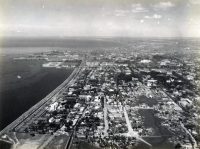Sunday. A fine Pepys am I but events move too fast to record. The massacre of the white people in this town sounds unbelievable, but it is true. I don’t understand why it is being hushed up in press and radio reports. They really aren’t telling very much about it, and I think it should be broadcast to the entire world, for it was an exhibition of such shocking savagery that even Attila the Hun would have felt like a kindergarten pupil in the school of cruelty!
So many old Manilaites have turned up, many of them with Army commissions. We live in a welter of majors,
colonels, etc. And it was a sort of relief to find one old friend, Fred, in the C.I.C. who never seems to have gone
beyond Private First Class—claims he is the oldest living GI. He has some hilariously funny stories to tell—one about being so worried about keeping in step when they were disembarking from a boat that he walked into the
water!
Last Monday a jeep roared up, and—great thrill!—it was Mike in a major’s uniform, bringing Hi with him.
It was a great moment. Hi was thin and sad, and reluctant to talk about the camp. Says he is having a sign made for himself: “Forbidden to mention Santo Tomas in my presence—Dangerous!”’
The house was full of paratroopers, officers, old Manilaites. We all had a merry lunch and refused to let Hi return to camp. Mike thought he could fix it. After all, hadn’t the First Cavalry come in just for the purpose of freeing Santo Tomasites?
I moved into the Belgian consul’s house. It is such a lovely place and the Japs moved out too hurriedly to
ruin it entirely. It is filthy and I have had a crew working there for days to get it cleaned up. I want a place where I can look after some of the people getting out of camp. There isn’t much furniture left any place, but we can borrow Army cots.
A couple of days ago, I think the 17th, old Georgie showed up, in a lieutenant-colonel’s uniform. He had been a captain last time I saw him. He said he had been working awfully hard in the battle of Manila, and now that it was about finished and the troops were in the walled city, he and his commanding officer wanted to have a party.
Me and a party! Good old days! So I dressed up in my best sharkskin suit, my best evening shoes, tied my
head up in a red scarf, and we were off to Caloocan, miles and miles away to his headquarters, for dinner. My first jeep ride!
I knew the city was badly damaged, burned, but I had not been able to visualize what real destruction could
be. I who had lived in Manila for more than ten years, could not identify many of the streets—we crossed at Calle Herran, below which a battle was still raging in the center of Manila. The street was full of shell holes and bomb craters. There were many dead bodies in the streets, both Japanese and Filipino and most of the
houses were smoldering ruins. We crossed on the pontoon bridge. Quite an experience!
We arrived at his headquarters, an old house belonging to wealthy Filipinos. The furniture was beautiful old Spanish stuff, but one living room was furnished in old-fashioned American rocking chairs, dozens of them,
and beside each chair was a huge porcelain cuspidor! All different colors.
The colonel in charge was a colorful character, a magnificent fighting man and very strong-minded. He had wanted a dinner party with lady guests, and he was having one! He had some friends in Santo Tomas he
asked to dinner but permission was refused them to leave the gates. He raised such a row that they were glad at the camp to change their minds and let them go. The same situation occurred at Bilibid where the Baguio people were still interned. The guests came, and a merry party it was! I had not seen those people for three years, either. What a dinner we had—and what a lot of Army officers!
The colonel had a wonderful array of potables, even some Cointreau, and we whipped up some sidecars
which had been George’s favorite in my house, prewar. The dinner was out of this world! Beefsteak, real Irish
potatoes, canned corn, and bread and butter! I ate so much I couldn’t manage the apple pie and cheese, so
they let me take it home with me. We all swapped yarns, so many varied stories—the Baguio internment camp,
Santo Tomas, mine as an “outsider,” and the tales of the Army’s rush to the Philippines. We had all been so
afraid they would bypass us, leave us until Japan was forced to surrender on her own ground—and of course, had that happened, we would none of us in Manila or Baguio have lived to tell any tales.
